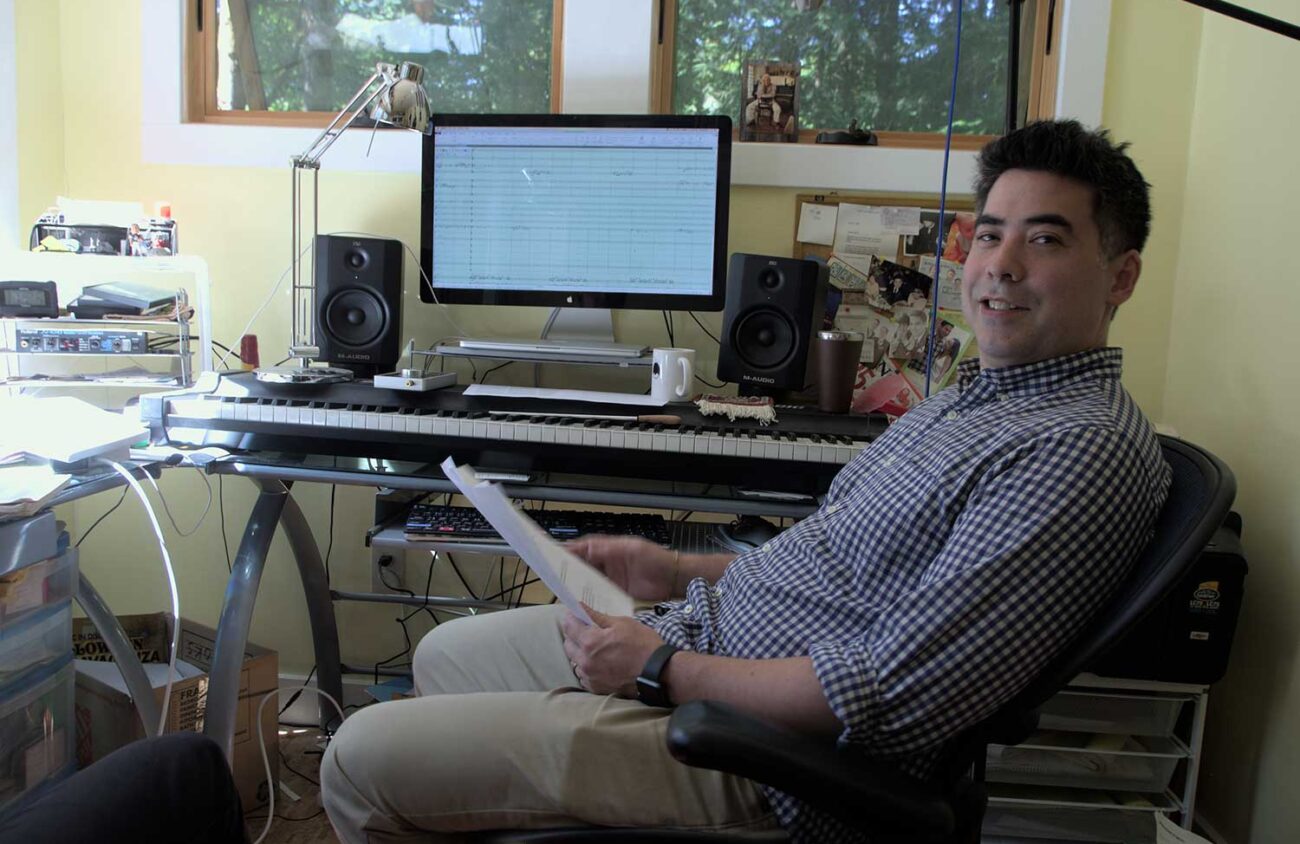Eight years ago, Eugene Ballet created an entirely new ballet from scratch. The Snow Queen, which was performed in April 2017, featured original choreography by Artistic Director Toni Pimble and an all-new orchestral score by Portland composer Kenji Bunch.
Now the ballet — as well as Bunch — are back again with another original show. When Peter Pan opens at the Hult Center on Friday, May 17, it will feature the largest and most ambitious piece of music Bunch has yet composed — a 95-minute score to be performed by 60 musicians in a live performance by OrchestraNext.
“This has been a conversation for years,” Bunch says of the project. “As soon as Snow Queen wrapped up, Toni mentioned her idea for Peter Pan.”
Work on the score began with a six-page outline Pimble sent to Bunch, tracing a visualization of every scene in her hour-and-a-half-long ballet version of the story: How long the scene was, its overall mood, and the substance and timing of emotional high points. She and Bunch had worked together the same way on Snow Queen.
Bunch rather liked that method of composing, and adopted it in his other work. “After Snow Queen I started making Toni-style outlines for all my compositions, just to organize them,” the composer says. “It helps to keep the proportions intact. When I’m composing, it’s easy to get lost in the weeds.”
Bunch began work on the music for Peter Pan but promptly fell into a creative slump. “I struggled mightily with this piece,” he says. “I was really intimidated. It was such a huge job, and it’s really important to do it right.”
What saved him, the composer says, was research he did on the story. While he was vaguely familiar with the classic tale of the boy who refused to grow up, it was reading about the life of Scottish novelist and playwright J.M. Barrie, who created the character of Peter Pan in the early 20th century, that allowed things to fall into place.
Barrie may have written about the boy who would never grow up in reference to his older brother, who died in an ice-skating accident the day before his 14th birthday.
Bunch thought about his own two children, ages 9 and 12, who are soon to outgrow their own childhoods. “I am at the tail end of the period of time when they are little kids who want to be around me and laugh at my jokes,” he says. “Their period of childhood play is coming to an end.”
Immersing himself in the story and its meaning opened the floodgates for the composer.
“The message of Peter Pan is the refusal to grow up, and mourning the loss of childhood. It all of a sudden really spoke to me. This is a way to avoid growing up — I can write whatever I want! Something opened up, and I began writing with less concern. It turned into, ‘I can do this — because it’s fun!’”
Bunch is known as a composer of music that is both sophisticated and accessible. Despite contemporary classical music’s hard-to-listen-to reputation, he successfully weaves together traditional melody and post-modern references. His sources include everything from classical masters such as Tchaikovsky to roots music, rock and roll and jazz.
“He has a really eclectic feel,” Pimble says of Bunch’s music. She’s been listening to the Peter Pan score — which has yet to be performed by live musicians — via computer-generated MIDI interpretations. “He isn’t stuck in any genre. He’s classical in the way he writes, but he pulls in other music.”
In his new score, Bunch even references a 19th-century sea shanty, “A Drop of Nelson’s Blood,” when the pirate ship appears. “I couldn’t help myself,” he laughs. “I really had fun working with that song and orchestrating it in different ways.”
Brian McWhorter, who will conduct OrchestraNext as it provides live music for the show’s three performances, has been friends with Bunch since the two musicians met while studying at The Juilliard School in New York. Presenting new music like Peter Pan is challenging and rewarding, the conductor says, because the musicians are creating the sound of the ballet for the very first time. “There is no reference recording we can look to for guidance.”
Overall, he says, the music for Peter Pan explores the tension between childhood play and the work of adulthood, much as Bunch’s score for Snow Queen juxtaposed cold and warmth. “I love the score,” McWhorter says. “I really do. It’s a joy to work on.”
The final performance of Peter Pan on Sunday will mark the 100th performance of OrchestraNext with Eugene Ballet since the orchestra was founded 12 years ago.
Peter Pan will be performed at 7:30 pm Friday, May 17, and at 2 pm Saturday and Sunday, May 18 and 19, at the Hult Center’s Silva Concert Hall. Tickets and more info at EugeneBallet.org.
